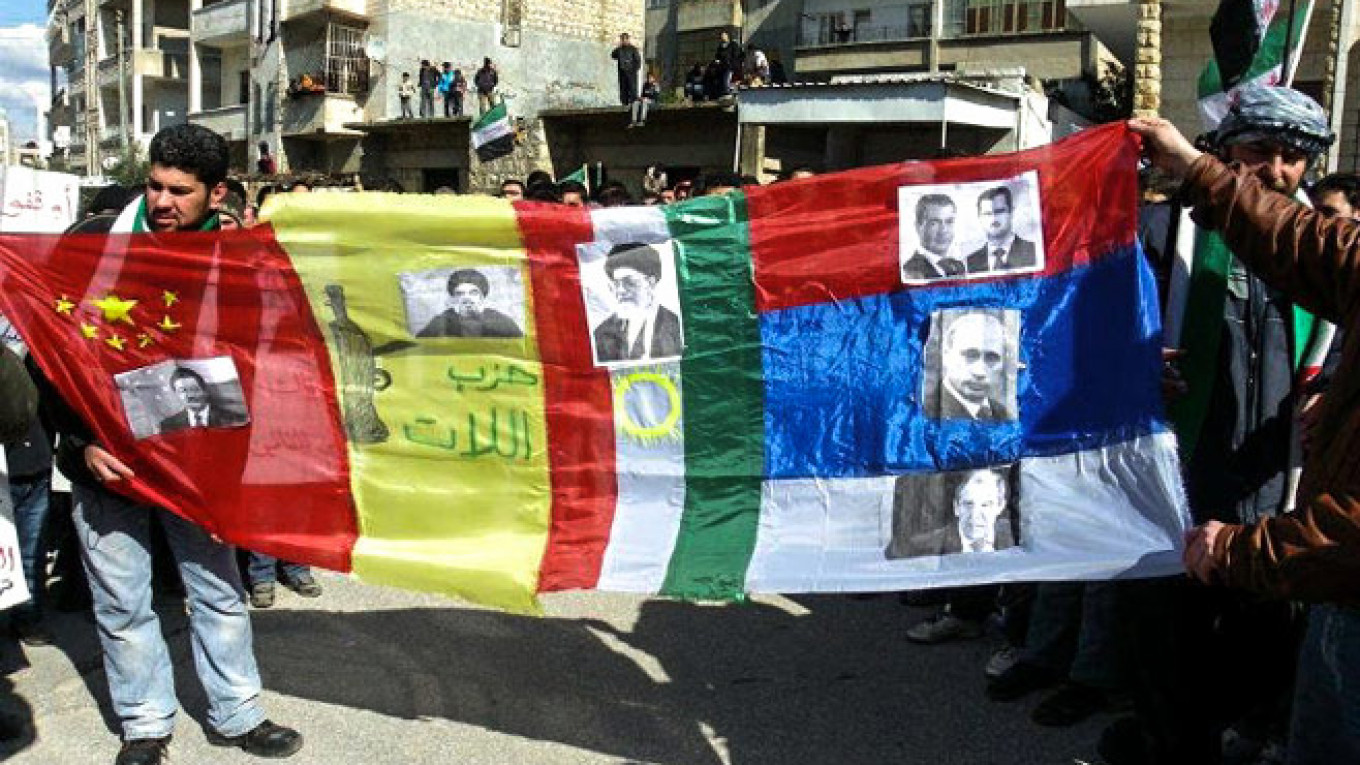For a handful of Syrian refugees living in the north of Moscow, the conditions of asylum in Russia are a bit out of the ordinary. They don't do anything stereotypical refugees do. They don't live in Red Cross camps or depend on humanitarian aid. Instead, they work as masseurs at Titan, a small Soviet-style iron gym that caters to aspiring body-builders and ex-army guys. Don't bother Googling; you won't find it.
I met Samir accidentally after purchasing a holiday massage package at Titan in late December 2013. I say accidentally, because I had mistaken the brunette dietician in a white lab coat for the masseuse. When the manager, Yelena, led me to a dark, windowless room in the back of the gym and introduced me to Samir, I initially regretted my buy.
At first, Samir and I didn't talk, and it wasn't until the third session that we found out we were both foreigners in Russia. And when he learned that my surname was Arabic, he opened up and told me more about himself. He spoke good English, as well as several other languages.
Samir came from a middle-class family in Aleppo and was fortunate to have left Syria in early 2012 before violence had completely destabilized the region. He first moved to Guangzhou, China and studied traditional Chinese massage, and came to Russia in September 2013 with the help of some Syrian connections in Moscow who helped him buy a wife for 200,000 rubles (about $8,000 at the time) and find a job.
"Buy a wife?" I asked.
Samir laughed. "Not a wife exactly, but it's a document that says I am married to a Russian girl. It's a really good document."
When asked if he had trouble with the authorities, he told me what I already knew.
"Just a question of money," he said
Then, a few days before the New Year's holidays I found Samir standing 20 meters from the gym behind a green dumpster. He looked nervous, and when I asked him what was up, he pointed to a gray truck marked with the logo of the Russian Emergency Situations Ministry. Two officials had come to the gym to inspect the facilities, and Samir managed to slip out the back door.
Although Samir had official documents to be in Russia, Titan paid him illegally — about 3,000 rubles ($90) for a 10 hour work day.
During the holidays, I got a call from Samir. He invited me out to a Syrian cafe, saying that he wanted "to talk."
The place was near Izmailovsky Park in the northeast of Moscow. Inside, we sat on comfortable sofas and drank beer in a lively Arabic atmosphere, filled with music, hookah smoke and a lot of Syrians. Outside the window, there was a meter of snow on the ground and you could see people skiing in the park. Samir told me he was lonely and unhappy in Moscow.
"I hate to be here. The weather is bad. I have no friends or family in Russia — I have nothing here. I want to go home."
When I asked him where that was, he shrugged and took a sip of beer.
"Maybe someday I return to Aleppo. Maybe not."
After an hour, we left the cafe and waited in the cold for the metro. Cigarette butts and a few used syringes littered the spaces between the train tracks. Samir spit and revealed to me that he had applied for official asylum in Sweden, the biggest host country for Syrians outside the Middle East.
"Praise God the Swedish take me — but until then, I'm foreigner, immigrant, refugee here. They give me all these names."
Our trains arrived and we parted ways, but his statement left me wondering. We were both foreigners, but we weren't treated the same way.
I took a break from my exercise at Titan over the holidays and sometime in the middle of January, I returned and knocked on the little locked door at the back of the gym for my final massage. To my surprise, a curly-haired Arabic masseur whom I didn't recognize opened the door.
"Where's Samir?"
The guy looked puzzled.
"Who's Samir? I'm Sami."
Confused, I went to the front desk and asked Yelena where he was.
"Samir wasn't good," she told me. "He was dishonest and clients complained that he was … inappropriate."
I called Samir several times, but there was no answer. After trying to reach him for a week, I gave up and assumed that he had disappeared.
Interviewing the new masseur provided little new information; he didn't know Samir but his own story was practically the same: Sami, a 25-year-old medical student when he left Syria, had come to Moscow via purchased documents and the Russia-Syria connection. He shared a one-bedroom flat in a high-rise apartment block with two other Syrians who also worked as masseurs.
Sami's tenure at Titan was to be short-lived. Within a month of replacing Samir, he too disappeared and was replaced by yet another Syrian.
I stopped thinking much about the Syrians, but then in late April, out of the blue, I got a WhatsApp call from a number I didn't recognize. It was Samir, calling from Stockholm.
Expecting some huge story about Russian Federal Migration Services drumming up charges against him and raiding his flat, I was shocked to learn the truth. Apparently, Samir had been having an affair with Yelena the Titan manager. Her husband, Timur, was a professional powerlifter who also owned the gym.
"He called and said he will kill me. I had to change numbers and go away," Samir said.
After the threat, Samir had gone underground in Moscow. He waiting for word on his application for asylum in Sweden and supported himself with part-time massage work and money from acquaintances in the Syrian community. Finally in late January his application for asylum was processed, and he boarded a plane for Stockholm.
Samir told me that he was now living a completely open life among people who knew who he really was. But I hung up the phone wondering if he had ceased being a refugee or foreigner because he had a permanent legal status, or if he was stuck with those labels for life.
Contact the author at artsreporter@imedia.ru
A Message from The Moscow Times:
Dear readers,
We are facing unprecedented challenges. Russia's Prosecutor General's Office has designated The Moscow Times as an "undesirable" organization, criminalizing our work and putting our staff at risk of prosecution. This follows our earlier unjust labeling as a "foreign agent."
These actions are direct attempts to silence independent journalism in Russia. The authorities claim our work "discredits the decisions of the Russian leadership." We see things differently: we strive to provide accurate, unbiased reporting on Russia.
We, the journalists of The Moscow Times, refuse to be silenced. But to continue our work, we need your help.
Your support, no matter how small, makes a world of difference. If you can, please support us monthly starting from just $2. It's quick to set up, and every contribution makes a significant impact.
By supporting The Moscow Times, you're defending open, independent journalism in the face of repression. Thank you for standing with us.
Remind me later.






